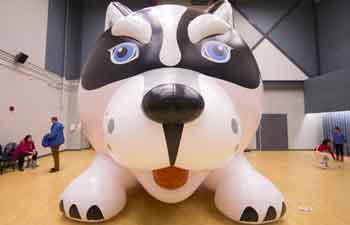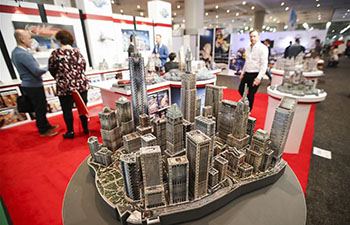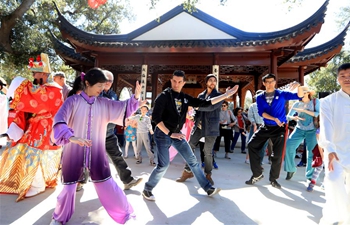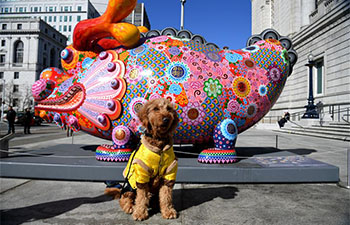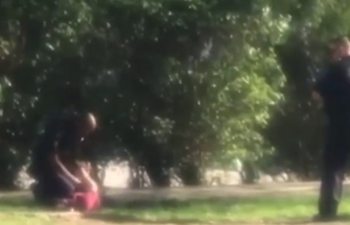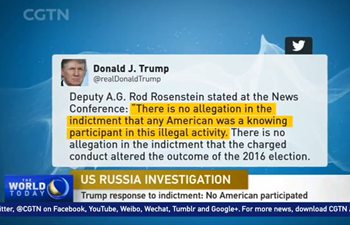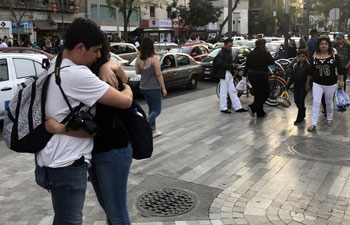by Julia Pierrepont III, Gao Shan
LOS ANGELES, Feb. 19 (Xinhua) -- The lush, flower-filled gardens, exotic Chinese pavilions and spacious performance areas of the Huntington Library, Art Collections and Botanical Gardens located in Los Angeles County, California, were packed this weekend with thousands of American visitors and tourists from other lands who all came to enjoy the exciting activities of the famed cultural institution's Chinese New Year Festival.
Friends, couples and families - many with kids in tow and toddlers in strollers - had smiles on their faces as they flocked to see the exotic Lion Dancers, the Mask-Changing Magician, the Hunan Singers, or learn the steps of an ancient Tai Chi kata, or put brush to paper to try their hand at the art form of Chinese calligraphy.
Gail Weiss, a local Pasadena resident, told Xinhua Sunday she came because, "Chinese culture is one of the most ancient living cultures in the world. I love coming to this Festival to learn more about it."
Lisa Blackburn, Sr. Editor and Special Projects Manager at the Huntington told Xinhua: "We started the Chinese New Year Festival in 2005. It's now our largest weekend of the year. We drew 8,000 visitors on Saturday and likely the same amount on Sunday."
More than 16,000 visitors over the course of a single weekend is a huge number for any cultural institution, many of which have seen their attendance dwindled by competition from cinemas, sporting events and online activities.
In the Chinese Zodiac calendar, each year is represented by an animal and 2018 is the Year of the Dog.
The capacity crowds were notable in that, though many had anticipated a higher attendance by Chinese or Asian visitors familiar with Chinese New Year, instead the crowds have been split nearly 50/50 with Asians and non-Asians, as many Americans and visiting tourists came out to see something new.
And new it was: Aside from the always entertaining and colorful lion dancers who pranced their way across the sunlit lawn to cries of delight from scores of watching kids, there was also a traditional masked and elaborately costumed 'mask changer' who magically changed his face six times at blinding speed with a sleight of hand Houdini, America's greatest magician, would have envied, plus a talented juggler who juggled hats, parasols, apples through the air and ended by pirouetting a fragile China teapot on the edge of a chopstick clamped between his teeth.
"How does he do that?" gasped a mesmerized 8 year-old American boy, "Benji", from Van Nuys, while his 6 year-old, tow-headed sister giggled, "I like the lions best."
The festivities also included well-received musical performances on a Chinese Dizi flute and a zither type stringed instrument, called a Guzheng, as well as a large, gold medal Tai Chi performance troupe that had the crowd enthralled.
Said Gladys Markham of Santa Monica, "I've never seen Tai Chi set to music and I find it fascinating. I can see why it is so beloved."
Some performers were home-grown Californians while others were arranged through the Chinese Consulate with whom the Huntington maintains a cordial and productive relationship.
Philip Bloom, the new Curator of the Chinese Garden at the Huntington, told Xinhua, "Americans can learn a lot from Chinese culture. We work closely with the Chinese Consulate General of Los Angeles to bring a variety of cultural programs to the Huntington."
Visitors also sat down to dip brush in ink to try ancient-style Chinese calligraphy which has a history of thousands of years.
Said Louise Merrit visiting from Upstate New York, "I thought my son would like to try the calligraphy, since he enjoyed painting the Chinese masks so much. We hoped to learn more about Chinese culture. There's not much chance to do that where we live."
Curator Bloom told Xinhua, "Calligraphy is a kind of living history - the discursive heart of the Chinese people. It's remarkable that something 2000 years old still resonates with people today."
Many of the festivities took place in Huntington's beautiful Chinese Garden, part of a multimillion dollar, two-phase construction project still underway at the Huntington. The First phase, known as the Chinese Garden "Liu Fang Yuan" or "the Garden of Flowing Fragrance," is styled after historic imperial gardens in mainland China.
It was a joint international effort between American landscapers and contractors and Chinese designers and skilled artisans from Suzhou, the renowned garden city of southern China, designed to promote the rich traditions of Chinese culture.
"One of the significant things about Chinese gardens is that each pavilion, sculpted stone or bridge is named for a famous Chinese work of literature, poetry, philosophy or art," explained Curator Bloom. "This makes Chinese gardens more symbolic and evocative of meaning, and provides deeper insight into the people who created it."
A Chinese garden, is like a scroll painting, presenting a series of carefully composed scenes. New vistas are revealed as one strolls along the pathways, with a number of key elements combining to create a sense of harmony and of beauty.
Ben Pitt, a Texan who moved to LA, told Xinhua. "I came today because I majored in Mandarin and spent a year in China teaching English and I miss the Chinese celebrations. Chinese cultural things like this garden and Tai Chi create a calm, meditative environment that really slows things down, so you can think about what really matters."
Said the blonde, blue-eyed Baker family with two youngsters in tow, "We love the Chinese Gardens. We visit them regularly as a family. They are a special environment that is tranquil and inspiring. The design is stunning and the kids love exploring it."
Mickey Constansa from Burbank told Xinhua on Sunday, "It feels like this beautiful Chinese pavilion has come 'alive' during the festival. Usually when we walk through here, it's empty and we can only imagine how it was used. But to see it in action, used as intended by these performers, is pretty wonderful."
"We hope that people to come to the garden not just to relax or meditate, but to be inspired - to write poetry, play music, and create art," concluded Bloom, who hopes to showcase local artists in an Art Gallery to be built in the Chinese Garden during Phase Two this summer.







